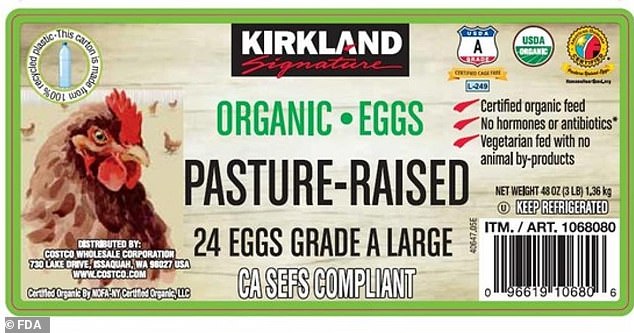FDA raises recall of Costco eggs to highest alert over fears salmonella contamination ‘could cause death’
The FDA has upgraded the Costco egg recall to the highest risk level due to salmonella fears.
On November 27, Handsome Brook Farms issued a recall message of 10,800 units of organic pasture-raised 24-count eggs sold under the Kirkland Signature brand.
The eggs were sold beginning Nov. 22 at 25 Costco stores in Alabama, Georgia, North Carolina, South Carolina and Tennessee.
New York-based manufacturer Handsome Brook Farms said the eggs were not intended for sale but had somehow been “accidentally” packaged and distributed.
The FDA updated the recall to a “Class I” because the eggs “may be contaminated with the bacteria salmonella, causing 26,000 Americans to be hospitalized each year.”
A “Class I” recall is a “situation in which there is a reasonable likelihood that use of or exposure to an infringing product will cause serious adverse health effects or death.”
The FDA says salmonella “can cause serious and sometimes fatal infections in young children, frail or elderly people, and others with weakened immune systems.”
Healthy people infected with the bacteria often experience fever, diarrhea, nausea, vomiting and abdominal pain.
On November 27, Handsome Brook Farms issued a recall for 10,800 units of Organic Pasture Raised 24-Count Eggs, sold under the Kirkland Signature brand.
In rare circumstances, the FDA says salmonella can cause the organism to “enter the bloodstream and cause more serious illness.”
This can cause serious, potentially life-threatening conditions, such as infected arteries, inflammation of the lining of the heart, and a type of arthritis called reactive arthritis.
The affected organic 24-count pasture-raised eggs have the UPC number 9661910680 and are packaged in plastic egg cartons labeled Kirkland Signature on the top.
The recall only applies to products with code 327 and a use-by date of January 5, 2025, which is printed on the side of the plastic egg carton.
No other products are affected by this recall.
It is unknown why the eggs were not intended for sale and the FDA is not confirming whether they tested positive for the bacteria.
Shauna Grob, head of operations and finance at Handsome Brook Farms, said Newsweek when the egg recall was initially announced, “No illnesses have been reported at all.
“We have received a number of calls from consumers to confirm if the units in their possession were recallable, but those have been the only interactions we have had with consumers to date since the press release and notice to Costco consumers .’

The organic pasture-raised 24-piece eggs with the UPC number 9661910680 are packaged in plastic egg cartons with Kirkland’s signature on the top

The recall only applies to products with the Julian code 327 and an expiration date of January 5, 2025, which is printed on the side of the plastic egg carton. No other products are affected by this recall
To prevent the incident from happening again, the company has implemented additional supply chain controls and retraining.
To date, no illnesses have been reported.
Consumers who have the recalled product should not eat the eggs and return them to the place of purchase.
Although thoroughly cooking eggs is the most effective way to prevent salmonella poisoning, the FDA says the recalled eggs should not be used for cooking or baking.
For any additional questions, customers are advised to contact Handsome Brook Farms.
Salmonella is caused by eating food contaminated with animal feces.
According to the CDC, it typically causes diarrhea, fever and stomach cramps that begin six hours to six days after the initial infection.
Most people recover within days, although the disease is responsible for more than 26,000 hospitalizations and 400 deaths each year.
